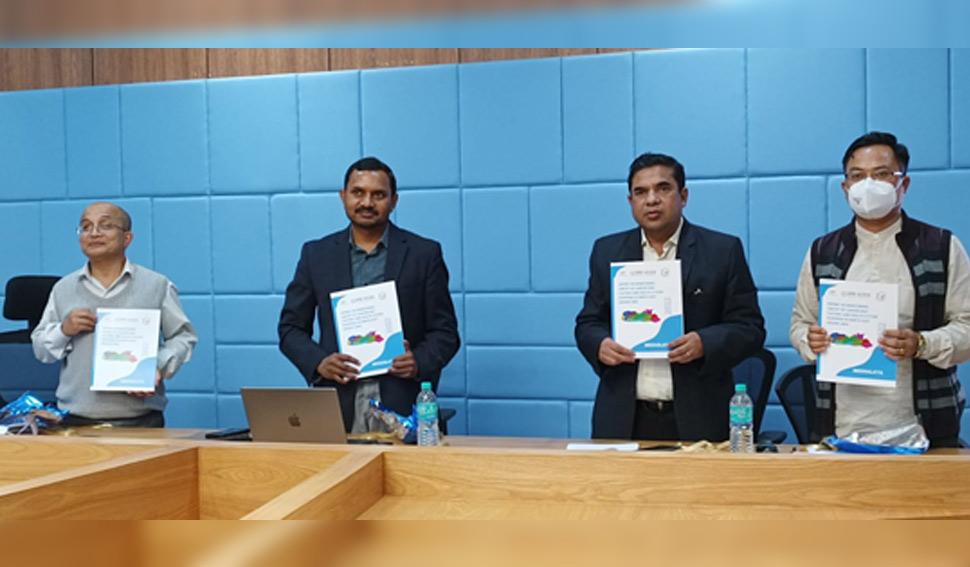Meghalaya to design a program to prevent cancer: report on ‘Monitoring Survey of Cancer Risk Factors and Health System Response released

A virtual event for the release of the report entitled ‘Monitoring Survey of Cancer Risk Factors and Health System Response in Meghalaya, 2021-2022’ was convened by the staff of Population-Based Cancer Registry (PBCR), Meghalaya, Civil Hospital Shillong, led by Dr.W.B Langstieh Principal Investigator, in collaboration with Indian Council of Medical Research (ICMR)-National Centre for Disease Informatics and Research (NCDIR), Bengaluru at Main Secretariat building, Shillong on 29th July 2022.
The Chief guest during the occasion was Sampath Kumar IAS, Principal Secretary Health & Family Welfare Department and Chairman PBCR, Meghalaya. The programme was virtually attended by Dr. Prashant Mathur, Director, NCDR-ICMR, PBCR colleagues’ along with other state dignitaries and partners from the Government and private institutions of Meghalaya.
Speaking at the inaugural function Dr. Prashant Mathur called for the need to improve cancer screening and bring cancer care centers nearer to the home of the people. He also emphasized on the need to declare cancer as a notifiable disease in Meghalaya to understand the actual burden of the disease and better collaboration between the government and the Population Based Cancer Registry
Dr. A. Dkhar, Jt. Director Health Services, in his opening remarks, highlighted the fact that cancer is among the top 5 leading causes of death in the state of Meghalaya. In NE Region, non-communicable diseases accounted for 58.8% of the total deaths while death due to cancer was 9.5%, the highest in India according to WHO in its 2018 profile.

Dr. Robert R Marak (Epidemiologist) Co-PI, District Surveillance Officer, IDSP also partook in the event and highlighted the key finding of the survey report. It was highlighted that there is a high prevalence of tobacco consumption (smoked and smokeless) in the state of Meghalaya and the current percentage of tobacco consumption stands at 52.5%. The trend in the age of early initiation of tobacco is 19.2 years. The survey also showed that 80.8% of respondents were exposed to passive smoke in the past thirty days. It may be noted that the survey report also highlighted the usage of betel products which has been observed to cause oral submucous fibrosis, a pre-cancerous condition that can progress to oral cancer. Currently, the consumption of non-tobacco betel products among respondents was 72.7% of which areca nut consumption was the highest.
Some other parameters that need attention were also highlighted in the event such as the mean age of early initiation of alcohol use was 21 years and 10% of the respondents were engaged in heavy episodic drinking. Over 60% of the respondents consumed preserved/salt curated & fermented products. More than half of the respondents (60.7%) were pre-hypertensive, about 21% of the respondents had central obesity, 8.3% of respondents were overweight, while 1.2% were obese. Also, the prevalence of raised fasting blood glucose was 1.7%. Health-seeking behavior was very low where about 29.2% of respondents never had their BP ever measured in life and only 16.4% of the respondents were aware of Ca screening for the three common cancers (Oral, breast & cervical).
Appreciating the release of the report-‘Monitoring Survey of Cancer Risk Factors and Health System Response in Meghalaya, 2021-2022, the chief guest of the occasion Sampath Kumar emphasized the need to focus on taking preventive care measures for reducing the alarming non-communicable disease burden in the state of Meghalaya, particularly cancer. Commending the work of Cancer Registry Cell-Civil Hospital, who had worked tirelessly for the survey even during the pandemic, he mentioned that the report has brought out valuable insights for the key stakeholders of the state, particularly for the citizens of the state.
He added, “Although there is a need to improve public health systems in terms of service delivery, there is also a need for adequate citizens participation and cooperation; people of the state should also invest time in understanding the causes of cancer, and how actually one can prevent cancer rather than finding solutions for treatment at a later stage.”
The Principal Secretary said that appropriate counseling must be given to people to avoid lapses in cases. He added, “If as a society, as a state, as a system know that a large number of children are smoking and people are in heavy episodic drinking habits, public health awareness must be promoted on these lines to explain that such algorithms will eventually lead to cancer at a later stage.” Therefore, he stressed the need to efficiently develop information and communications around these lines and prevent people from falling into the trap of indulging in cancer-causing elements and work to reduce the cancer burden in the state.
Giving an example of drug addiction or substance abuse which is a progressive disease, it was explained that a minimum of three times consumption of such substances at a young age will lead to permanent addiction, and rarely do such individuals return to normalcy. This is where awareness must be given to the young boys and girls at a growing stage to never try it even once.
It was stated that Meghalaya will focus more on the preventive care aspect for Cancer and based on the report the state will design a program to prevent cancer in the state and allocate appropriate resources accordingly for policy-making work. The approach should not only be a clinical cure approach which has been a long-followed approach but a preventive care approach. The state is also looking at avenues for valuable research which is being conducted in the country for the early identification and prevention of cancer in the state particularly related to oral, cervical and breast cancer.
The forum also requested the research fraternity of ICMR to identify research-based preventive care measures that can be taken and applied for screening all forms of cancers as these would be beneficial for a state like Meghalaya. At any given point in time, the registry area has around 1800-2000 new cancer cases; the target should be to work with a sense of urgency in a similar way to that of Covid-19 and in order to make a dent in the reduction of non-communicable diseases, we must prevent cancer!

Leave a Reply